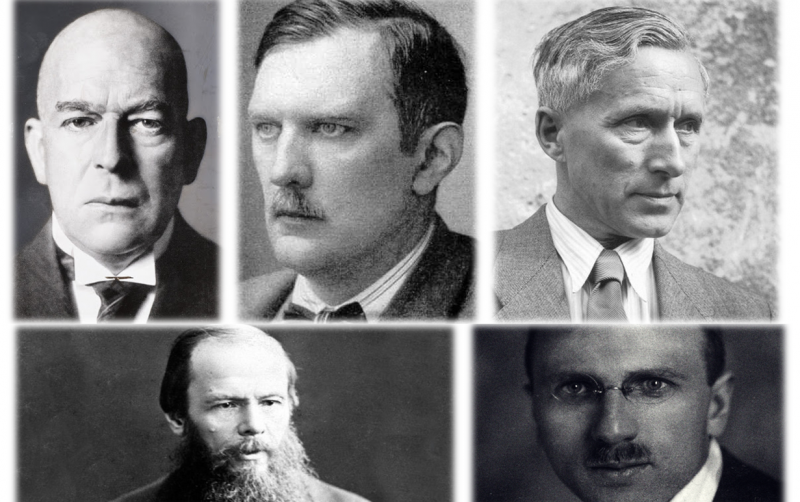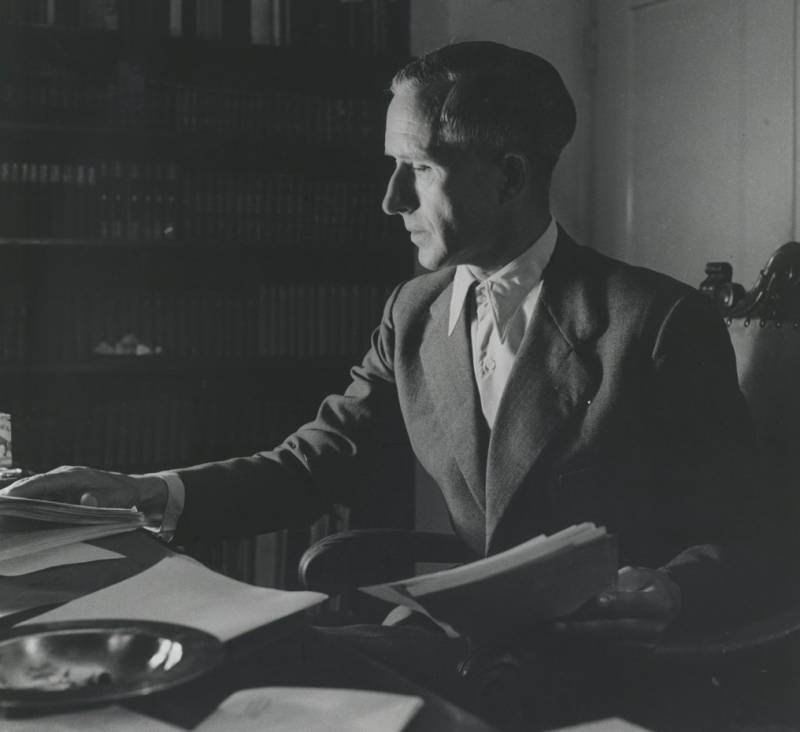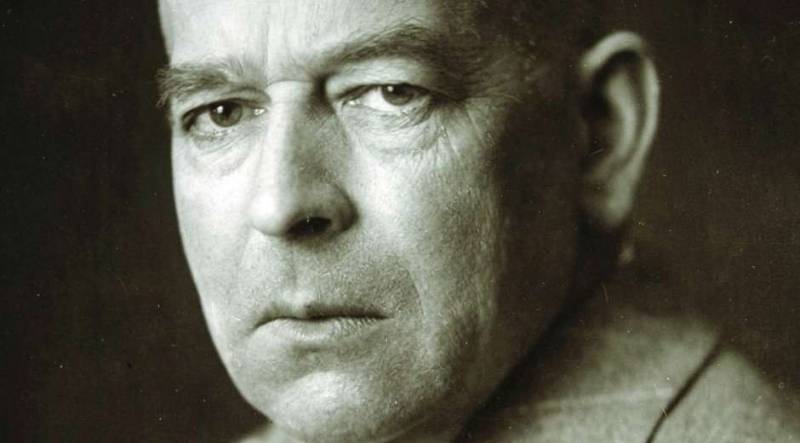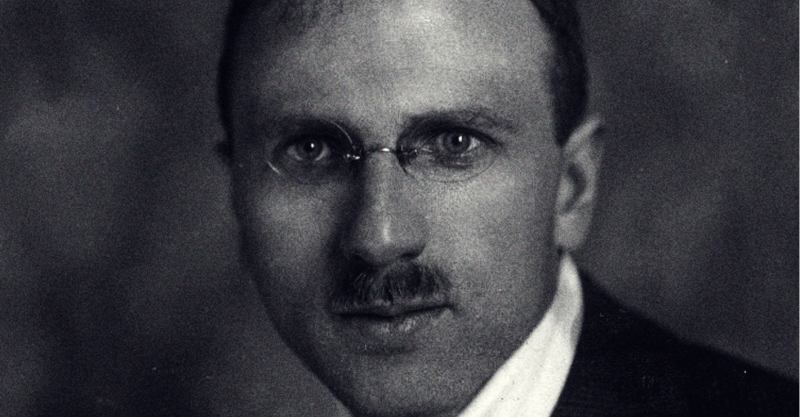The image of Russia in the works of representatives of the "Conservative Revolution"

Revolutionary conservatism is a paradoxical phenomenon that arose after the First World War and became firmly established in the political lexicon of the XNUMXth century. Being in implacable opposition to the liberal Weimar Republic, representatives of the "conservative revolution" called for radical changes in the name of higher, national (German) values. The proclaimed "conservative revolution" was supposed to serve the achievement of these goals.
As the historian Leonid Luks notes, the XNUMXth century, which ended in Europe with the victorious march of the liberal-democratic system, began with a revolt against liberal societies and the values they defended.
says the historian.
It should be noted here that Russian culture had a certain influence on the representatives of the "conservative revolution", who generally had a positive attitude towards Russia. Grigory Siplivy in his book “Gestalts of the Conservative Revolution” notes the Russophilia of all significant “conservative-revolutionary” authors. In this material, we will try to answer the questions - how Russia was seen by the representatives of the German "conservative revolution", and what influence Russian culture had on this movement.
Fyodor Dostoevsky is a cult figure for representatives of the "conservative revolution"
As Grigory Siplivy notes, the theme of Russia in the intellectual canvas of the "Conservative Revolution" is most often found in two contexts - in the context of spiritual space and a unique identity that connects the ossified "civilization" of the West and the young "culture" of the East, and in the context of the Bolshevik project under construction. As you know, a significant part of the "conservative revolutionaries" (with the exception of the National Bolsheviks) were rather skeptical about the latter.
It should be noted that after the First World War among German intellectuals there was a real discovery of Russian culture, which was facilitated by a large influx of emigrants from Russia, as well as such a culturalhistorical phenomenon as a "conservative revolution", whose representatives - Arthur Möller van den Broek, Carl Schmitt, Oswald Spengler used in their writings some of the ideas expressed earlier by Russian Slavophiles and soil scientists, which contributed to the popularization and in-depth processing of the heritage of Russian thinkers. In particular, of great interest is the period associated with the intellectual influence of the political worldview and socio-political concepts of Russian soil movement represented by N. Ya. Danilevsky and F. M. Dostoevsky on the representatives of the German conservative revolution - Oswald Spengler and Arthur Möller van den Broek [2 ].
Fyodor Mikhailovich Dostoevsky, equally with Friedrich Nietzsche, is becoming a cult figure not only for Russia, but also for conservative intellectuals in Germany. The foundation for Dostoevsky's enormous popularity in conservative circles in Europe was laid by Arthur Möller van den Broek. Living in Paris, he marries a Latvian, Lucy Kerrick. His wife's sister, Lassie Kerrick, translates Dostoevsky's works into German. It is not known for certain what the contribution of Arthur Möller to the direct implementation of the translation is, however, Alain de Benois in his work “Biography of a Conservative” indicates that the translation was the result of the joint efforts of A. Möller, D. Merezhkovsky and “E. K. Rasina” (pseudonym of Sister Lucy) [3].
As Alain de Benoit noted:
Dostoevsky becomes a cult figure for conservatives of various generations for many reasons. Contrary to Marxist cliches, the writer's rejection of the blind quantitative progressivism of the bourgeois world does not come from "reactionary" or "chauvinism". The entire personal life path of the writer only creates the conditions for hating the world of a seemingly traditional order. It is well known that the writer suffered from the government of the Russian Empire, being on the verge of deprivation of life by the will of the state. Being unjustly deprived of freedom for many years, Dostoevsky does not take the position of the liberal-Western camp, which glorifies "freedom" as the only truth of the new man. Dostoevsky's conservatism is a strong-willed and spiritual choice, the result of the highest consent of the needs of the soul [4].
This "conservatism of the spirit" is similar to the Nietzschean position. Fyodor Mikhailovich Dostoevsky forges his values and beliefs for himself, and does not follow a utilitarian and pragmatic vector. Such conservatism of free choice has nothing to do with state protection and the reactionary fear of change for fear of losing their privileged position [4].
The relevance of Dostoevsky for "conservative revolutionaries" is due to his talent to see the compositional panoramas of social reality and anticipate the implicit patterns of the future. According to Arthur Möller,

Ernst Junger
For another "conservative revolution" thinker, Ernst Junger, Fyodor Dostoevsky is also of particular importance. As A. V. Mikhailovsky notes,
It can be said that Jünger uses the figure of Dostoevsky as a spiritual and moral guide in his criticism of the Modern. In the work of Dostoevsky, vaguely perceptible prolegomena of the coming existential oblivion of late Modernism are found. Thus, in the preface to Radiations, Jünger names Dostoevsky along with Poe, Hölderlin, Tocqueville, Burckhardt, Nietzsche and Blois "prophetic mind"(ein prophetischer Geist) [4].
Often mentions Dostoevsky in his work and Oswald Spengler. In the second volume of The Decline of Europe, Spengler refers to Dostoevsky in connection with the consideration of the "Russian soul". Fyodor Mikhailovich in Spengler appears as a folk figure, an ascetic and a sufferer, metaphysically involved in the anguish of the Russian people [4]. Spengler develops the theme of dual opposition, characteristic of the conservative environment: Dostoevsky - Tolstoy. Tolstoy personifies Westernism and almost Marxist socialism, while Dostoevsky is the spokesman for the original folk and peasant.
The civilizational approach of Oswald Spengler and "Russia and Europe" by Nikolai Danilevsky

Oswald Spengler
The cultural morphology of the German philosopher Oswald Spengler closely adjoins the concept of cultural-historical types of Nikolai Danilevsky. There are many unifying moments in the teachings of the two thinkers, although they are not without fundamental differences [2]. Undoubtedly, Spengler was familiar with Russian Slavophilism, and possibly with the concept of N. Danilevsky. The very theme of the opposition between Russia and Europe, as well as Russia's "special path" is characteristic of many thinkers.
Oswald Spengler, like the Russian scientist N. Danilevsky before him, was a supporter of the concept of cyclic development of cultures. He believed that a separate culture, like a living organism, including a person, goes through its cycle of existence from birth to flourishing and subsequent decline and death. Each culture is a peculiar organism, having its own "soul" and characteristic features, but all types have something in common, namely the same phases of development. The cyclic concept opposes the idea of a linear unidirectional development of all cultures with common human values.
In his fundamental work The Decline of the Western World (better known in Russia as The Decline of Europe), Spengler writes:
All the so-called "world-historical" and "eternal" values are the values of a certain generation of people of a certain culture.
In the structure of society, Spengler singled out the smallest unit - a single genus, and the largest - the people. The people go through three stages: the proto-people to the stage of culture, the nation to the stage of culture, and the fellah people to the stage of civilization. The people as a unity characterizes the degree of readiness to defend their existence [8].
History is shaped by the will of individual people around whom an active minority is grouped, as L. N. Gumilyov would say, - passionaries. Through them, the will of individuals is affirmed in the life of the people [8].
At the stage of civilization, the mass appears as the fourth estate. These "fundamentally rejecting the culture of the new nomads of world capitals”, according to Spengler, are harbingers of the death of civilization. The mass is created by civilization as its gravedigger.
N. A. Berdyaev in his work “The Deathly Thoughts of Faust” (1922), dedicated to Spengler’s book “The Decline of the Western World”, was the first to draw attention to the coincidence of the views of Danilevsky and Spengler. He noticed that
And later, in the work "Russian Idea" (1943), he again emphasized that Danilevsky - "predecessor of Spengler" and "expresses thoughts very similar to those of Spengler».
Indeed, both Spengler and Danilevsky followed the concept of the cyclical development of culture and criticized evolutionary ideas. Both Spengler and Danilevsky believed that the West and Russia are different cultures, doomed to "systematic misunderstanding» each other [8].
Both Spengler and Danilevsky consider Russian culture to be younger than Western culture and prophesy a great future for it. They similarly define the fundamental feature of Western and Russian culture, but since their own culture is closer and dearer to each of them, then violence as a fundamental feature of Western culture, according to Danilevsky, Spengler softens to the will to power, and tolerance as the main characteristic of Russian culture, opposing, like Danilevsky, the desire for dominance, reduces to lack of will [8].
According to Spengler, Russia is interested in the West, because in Russian civilization there is a desire to embrace the world and conclude it in a fraternal union, while Western civilization does not have this - we are “alien” and “alien” for them, which must be conquered.
Of interest is the position of O. Spengler, outlined by him in the book "Prussianism and Socialism", regarding the relationship between Russia and Europe. On the issue of Europe's attitude towards Russia and the Slavs, he speaks very categorically, confirming the position of the Slavophiles. Comparing and contrasting two worlds, two high cultures - the Western world and the Russian world, he writes:
This is a direct analogy with the thesis of N. Ya. Danilevsky, who argued that there may be disagreements between various European countries, but hostility to Russia and the Slavs unites seemingly irreconcilable opponents, as was the case in the Crimean War, in the war for the liberation of Bulgaria [2] .
As the researchers Gorelov A. A. and Gorelova T. A note, people belonging to different cultures may have (like Danilevsky and Spengler) similar views on some fundamental issues, and this can hardly be fully explained by the pseudomorphosis of cultures.
"Conservative Revolution" and Bolshevism

Ernst Nikisch
As Grigory Siplivy notes, all the major representatives of the intellectual movement, be it the “Young Conservatives”, “National Revolutionaries” or “National Bolsheviks”, to one degree or another gravitated towards Russia and the Eastern orientation, up to transcontinental geopolitical Asian projects. The question was not sympathy for Russia, but the attitude towards Bolshevism as a positive or destructive phenomenon [4].
A significant part of the "conservative revolutionaries" were still very skeptical of Bolshevism. As historian Oleg Terekhov notes, according to Spengler, Bolshevism is the legacy of Tolstoy, not Dostoevsky. Bolshevism combined everything that the borrowed and misunderstood and misunderstood Faustian culture brought to “Russian soil”: civilization, progress, large cities, the dominance of socio-political motives in society, the intelligentsia, who dreamed of freedoms and reforms. At the same time, Spengler notes that the Bolsheviks are not the entire Russian people, and not even a part of it. Bolshevism is a sect rejected by the very same pro-Western stratum of Russian society, and therefore unbending in its nihilism and denial of Western values in their formal declaration [11].
writes Spengler in The Decline of the Western World.
In the second volume of The Decline of Europe, Spengler also touches on the essence of Russia's economic life through the prism of Bolshevism. In Russia, in his opinion, there are two economic worlds: one is the upper, alien, infiltrated from the West, to which Western and non-Russian Bolshevism belongs; and the other is the peasant world, ignorant of cities, living in the depths of the endless Russian plain [11].
Spengler's understanding and perception of Bolshevism was fully reflected in his last significant work, Years of Decisions, which was published in July 1933. With this approach, Bolshevism is understood by him in a new light - as the main component of the struggle of Asia against Europe. Moscow became after 1917 a decisive factor for the whole world. From a historical point of view, the victory of the Bolsheviks means, according to Spengler, something different for the history of Russia.
he says.
Bolshevism is losing its original "Western" character and now appears not as a new form of pseudomorphosis of Russian history, but as a specifically "Asiatic" phenomenon: Spengler refuses to call the Bolshevik regime a state in the Western sense of the word, which, in his opinion, at all costs was Petrine Russia.
Spengler also asks the question: is the communist program worth taking seriously, or is it just a ploy by the ruling regime of Soviet Russia to suppress the masses? He believes that if we remove the communist terminology, then state capitalism dominates in Russia [11]. The thinker does not arrive at a final answer.
Initially considering Russian Bolshevism as a product of Western Faustian culture, alien to the primordially Russian-Asian worldview, Spengler eventually recognized the presence of soil-nationalist tendencies in it, which, in his opinion, should sooner or later prevail over Western Marxism in its ranks [11 ].
Oswald Spengler, like Arthur Möller van den Broek, denied Marxist internationalism and put forward the principle "each people has its own socialism." The Bolshevik uprising has the right to exist within the Asian landscape of Russia, but German socialism is Prussian socialism. At the same time, Möller van den Broek believed that political cooperation between German nationalism and Bolshevism was possible with mutual respect for the peculiarities of the socialist project in both countries and the refusal to export national socialism or Bolshevism. Thus, Möller van den Broek believed that the national peculiarity of socialism and the anti-Versailles orientation of the foreign policy position can serve as the basis for political interaction [12].
In turn, one of the representatives of the “conservative revolution”, the National Bolshevik Ernst Nikisch, argued that the land, anti-urban, anti-civilization, anti-rationalist nature of the German spirit pushes the German people towards an orientation to the east, where, in alliance with Russian Bolshevism, Germany will be able to regain political greatness [ 12].
For Ernst Nikisch, as the ideologist of German National Bolshevism, Marxism, of course, was not a simple "mask" for the Russian people's revolution. He uses the class and economic theory of Marxism, but denies faceless global internationalism. Compared to the Young Conservatives, Nikisch's position is more rational and materialistic; he relies not only on metaphysics and worldview reasoning, but also on socio-economic data [4].
Conclusion
Based on the foregoing, we can conclude that Russian culture had a fairly significant impact on the "conservative revolution", and the ideas of the Slavophiles and Russian soil were popular with many German intellectuals belonging to this movement.
In particular, Nikolai Danilevsky and Oswald Spengler were unanimous not only that European civilization was approaching its end, but also that the next culture to enter the historical stage would be Slavic culture, or, as Spengler also calls it, "Russian-Siberian».
he writes.
In addition, the undoubted link between the philosophy of soil movement in Russia and the Young Conservatives in Germany is the work of F. M. Dostoevsky, with whom the latter were very familiar. Thus, regardless of the degree of mutual influence in the field of methodology of the theory of culture, we can observe a very sensitive perception by German conservative revolutionaries of the spiritual component of Russian soil, indicating a certain relationship between conservative concepts in Germany and Russia [2].
Использованная литература:
[1] Lux L. “Special paths” of Russia and Germany on the example of Eurasianism and the “conservative revolution” // Ideology of the “special path” in Russia and Germany: origins, content, consequences / Ed. E.A. Pain. - M., 2010. - p. 96-117.
[2] Alexander Kamkin. Ideas of Russian soil workers and German conservative revolutionaries [Text] / A. Kamkin // Modern Europe. - Moscow, 2009. - N 4. - p. 110-119.
[3] Benoit A. Arthur Meller van den Broek: Biography of a Conservative / transl. from fr. A. Ignatieva [Electronic resource] // URL: https://s3-eu-west-1.amazonaws.com/ alaindebenoist/pdf/amvdb_biografiya_konservatora.pdf.
[4] Siplivy G.N. Gestalts of the "Conservative Revolution". - M.: NP "Posev", 2022.
[5] Mikhailovsky A.V. Russian addition to the superman. Ernst Jünger reads Dostoevsky // Dostoevsky: Materials and Research. T. 18. St. Petersburg: Nauka, 2007.
[6] Spengler Oswald. Sunset of Europe. Essays on the morphology of world history. - Vol. 1: World-historical perspectives. – M.: Thought, 1998.
[7] Spengler Oswald. Sunset of Europe. Essays on the morphology of world history. - Vol. 2: World-historical perspectives. – M.: Thought, 1998.
[8] Gorelov, A. A., Gorelova, T. A. 2016. “The Decline of Europe” by O. Spengler and the Possibility of the Decline of the World. Knowledge. Understanding. Skill 1: 29–43. DOI: https://doi.org/10.17805/zpu.2016.1.2.
[9] Berdyaev N. A. Faust's dying thoughts // Fall of the sacred Russian kingdom. - M., 2007.
[10] Spengler Oswald. Prussianism and socialism. – M.: Praxis, 2002.
[11] Terekhov O.E. Bolshevism in the cultural and historical concept of Oswald Spengler // Bulletin of the Tomsk State University. 2017. No. 417. P. 163–168.
[12] Artamoshin S.V. National Bolshevism and the Conservative Revolution in Germany in Search of Political Allies // Bulletin of the Bryansk State University. 2019. No. 4 (42). pp.29-34.
Information